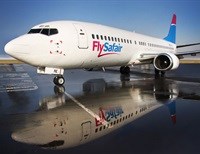
"This has exceeded initial expectations and we're anticipating an exciting year ahead," FlySafair CEO Dave Andrew said.
"Although domestic passenger services is a new offering for us, we're in the fortunate position of having the backing of Safair Operations, an established company with the necessary air-side infrastructure already in place and that has been in operation for the past 50 years. Our move into commercial services was a natural progression and, I believe, one that the market has long been waiting for.
"As South Africa's first true low-cost carrier, we feel very strongly that our passengers should not be charged for services they don't use. For example, if you're simply flying from Cape Town to Joburg for a day business trip, there's no need to incur the cost of luggage. This sets us apart from the many so-called low-cost carriers who charge a flat fee for the trip.
"In their numbers, passengers are now recognising that they need only pay for the services they actually require and we've made a commitment that our fares will always be affordable, honest and transparent, offering passengers genuine value on each and every one of our flights."
FlySafair also takes part in many corporate social investment initiatives by making an aircraft available for special projects. Safair has transported medical supplies and food relief into inaccessible territories for the United Nations, the World Food Programme and a host of other international aid agencies.
Another project involved the relocation of black rhinos. Working for various donors and benefactors, including the Frankfurt Zoological Society, Dube Trade Port and Worldwide Flight Services, Safair transported over 30 of these gentle giants in a Hercules aircraft from South Africa to the Luangwa Valley Conservancy in Zambia and to Seronera in Tanzania - two areas where these animals were on the verge of extinction. Not a single rhino was lost during the transportation process and, as far as is known, none have been poached in any of the areas to which they've been relocated.
Safair also undertakes flights into Antarctica on an annual basis for the Italian Antarctic research programme, as well as various other governmental organisations.